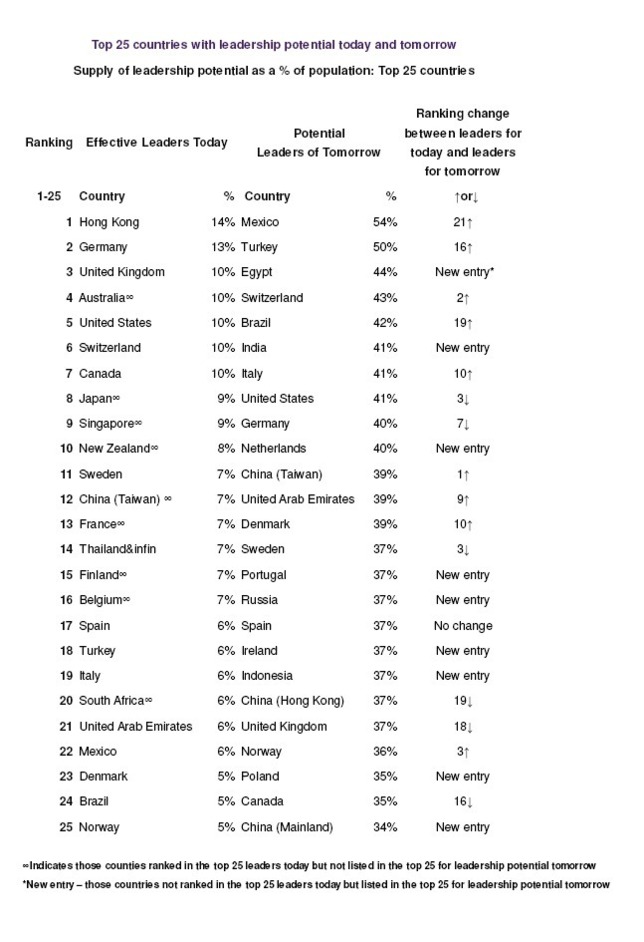
SHL, the global leader in talent measurement solutions, today announced the release of its first Global Leadership study, providing a worldwide view of leadership potential. The study identifies the top 25 countries with the greatest supply of potential leaders relative to its workforce, based on the analysis of over a million people from SHL’s global Talent Analytics™ database. While the US currently ranks 5th in the world in leadership potential today, the nation risks a declining position as corporate globalization outpaces leadership identification and development programs, at home and abroad.
According to the study, the landscape of leadership potential changes significantly when analyzing the supply of leadership talent for tomorrow *. Mexico, Turkey, Egypt, Switzerland, and Brazil have the greatest source of potential future leaders. In contrast, today’s top ranked countries such as the UK drops 18 places to fall out of the top 20 and Hong Kong falls from pole position to 20th, while Mexico and Brazil jump 19 and 21 places respectively, with Mexico topping the table.
“While the study suggests a moderate slide in US rank from 5 today to 8 tomorrow – the bigger issue is the risk of falling into a steady declining trend in our supply of leaders, especially as domestic-based companies continue to expand internationally to compete in the global economy,” explained Caroline Paxman, President of the Americas for SHL. “In order to survive, no less grow, US companies need to employ programs to better identify leaders of the future – and become more competent in analyzing and sourcing international talent pools to find them.”
“There is a looming leadership crisis in many economies today. The shortages of key skills remains a challenge for the majority of global organizations we study, and companies cannot hire their way out of this deficit,” said Mollie Lombardi, Research Director, HCM at Aberdeen Group. “Organizations must focus on finding and developing future leaders, and 52% of Best-in-Class organizations in our latest assessments study cite using objective assessment data to identify high-potential talent and build development plans as a top strategy.”
SHL offers five guidelines to cultivating leadership success across an organization:
- Make It a Priority: Acknowledge the risk, and put a formal action plan in place. Start by clearly defining the behaviors and skills which make a successful leader in your organization.
- Look Beyond Performance: Have a full picture of the leadership potential across your organization and don’t restrict that view to only those you think are high potential. Do not confuse ambition with ability.
- Replace Subjectivity with Objectivity: Gut instinct won’t do. Using scientific data, benchmark your people against competitor talent and identify leadership shortages to avoid succession risk.
- Be Pragmatic & Proactive: Don’t wait for yearly review cycles, instead, employ development interventions at the point-of-pain with individual employees or across departments. This includes where and when to spend learning and development budgets throughout the company.
- Cast a Wider Net: Take a global view of where your leadership talent is located and be prepared to use creative strategies to source talent across borders to fill leadership gaps.
According to the study, the landscape of leadership potential changes significantly when analyzing the supply of leadership talent for tomorrow *. Mexico, Turkey, Egypt, Switzerland, and Brazil have the greatest source of potential future leaders. In contrast, today’s top ranked countries such as the UK drops 18 places to fall out of the top 20 and Hong Kong falls from pole position to 20th, while Mexico and Brazil jump 19 and 21 places respectively, with Mexico topping the table.
“While the study suggests a moderate slide in US rank from 5 today to 8 tomorrow – the bigger issue is the risk of falling into a steady declining trend in our supply of leaders, especially as domestic-based companies continue to expand internationally to compete in the global economy,” explained Caroline Paxman, President of the Americas for SHL. “In order to survive, no less grow, US companies need to employ programs to better identify leaders of the future – and become more competent in analyzing and sourcing international talent pools to find them.”
“There is a looming leadership crisis in many economies today. The shortages of key skills remains a challenge for the majority of global organizations we study, and companies cannot hire their way out of this deficit,” said Mollie Lombardi, Research Director, HCM at Aberdeen Group. “Organizations must focus on finding and developing future leaders, and 52% of Best-in-Class organizations in our latest assessments study cite using objective assessment data to identify high-potential talent and build development plans as a top strategy.”
SHL offers five guidelines to cultivating leadership success across an organization:
- Make It a Priority: Acknowledge the risk, and put a formal action plan in place. Start by clearly defining the behaviors and skills which make a successful leader in your organization.
- Look Beyond Performance: Have a full picture of the leadership potential across your organization and don’t restrict that view to only those you think are high potential. Do not confuse ambition with ability.
- Replace Subjectivity with Objectivity: Gut instinct won’t do. Using scientific data, benchmark your people against competitor talent and identify leadership shortages to avoid succession risk.
- Be Pragmatic & Proactive: Don’t wait for yearly review cycles, instead, employ development interventions at the point-of-pain with individual employees or across departments. This includes where and when to spend learning and development budgets throughout the company.
- Cast a Wider Net: Take a global view of where your leadership talent is located and be prepared to use creative strategies to source talent across borders to fill leadership gaps.

Additional findings from the study:
- Globally, only 1 in 15 (6.7%), managers and professionals qualify as leaders today. 1 in 3 managers and professionals have the next tier of leadership potential, but for this level of people the journey to realize that potential is longer and needs targeted investment. The value of investing in these people is substantial because there are six times as many managers and professionals with this level of potential than leaders for today.
- In China (Taiwan), Germany, Sweden, Switzerland and United States, the supply of leadership for today and tomorrow is stronger than the average global supply. While competing for leadership talent remains a challenge in these geographies, the odds of finding effective leaders for today are significantly higher at 1 in 10 vs. the global average of 1 in 15.
About SHL - People intelligence. Business results.
SHL is the leader in talent measurement solutions, driving better business results for clients through superior people intelligence and decisions - from hiring and recruiting, to employee development and succession planning. With a presence in over 50 countries, SHL delivers more than 25 million assessments annually in over 30 languages - allowing over 10,000 business customers to benefit from both global expertise and local insight. Along with its world-class consulting practices and 24-hour support center, SHL clients can access over 1,000 assessments through an easy-to-use technology platform. SHL was acquired in 2012 by CEB, the leading member-based advisory company. By combining the best practices of thousands of member companies with advanced research methodologies and human capital analytics, CEB equips senior leaders and their teams with insight and actionable solutions to transform operations. Headquartered in London, UK, SHL has offices in North and South America, Europe, the Middle East, Africa, Asia and Australia/New Zealand. For more information, visit www.shl.com.
- Globally, only 1 in 15 (6.7%), managers and professionals qualify as leaders today. 1 in 3 managers and professionals have the next tier of leadership potential, but for this level of people the journey to realize that potential is longer and needs targeted investment. The value of investing in these people is substantial because there are six times as many managers and professionals with this level of potential than leaders for today.
- In China (Taiwan), Germany, Sweden, Switzerland and United States, the supply of leadership for today and tomorrow is stronger than the average global supply. While competing for leadership talent remains a challenge in these geographies, the odds of finding effective leaders for today are significantly higher at 1 in 10 vs. the global average of 1 in 15.
About SHL - People intelligence. Business results.
SHL is the leader in talent measurement solutions, driving better business results for clients through superior people intelligence and decisions - from hiring and recruiting, to employee development and succession planning. With a presence in over 50 countries, SHL delivers more than 25 million assessments annually in over 30 languages - allowing over 10,000 business customers to benefit from both global expertise and local insight. Along with its world-class consulting practices and 24-hour support center, SHL clients can access over 1,000 assessments through an easy-to-use technology platform. SHL was acquired in 2012 by CEB, the leading member-based advisory company. By combining the best practices of thousands of member companies with advanced research methodologies and human capital analytics, CEB equips senior leaders and their teams with insight and actionable solutions to transform operations. Headquartered in London, UK, SHL has offices in North and South America, Europe, the Middle East, Africa, Asia and Australia/New Zealand. For more information, visit www.shl.com.
Autres articles
-
Coinbase et Visa, un partenariat pour des transferts en temps réel
-
Brilliantcrypto, la nouvelle aventure play-to-earn basée sur la blockchain Polygon, arrive sur Epic Game Store
-
Nomination | Truffle Capital promeut Alexis Le Portz en qualité de Partner
-
IPEM Paris 2024 : 5500 participants au Palais des congrès
-
Pomelo annonce une Série A à 35 millions de dollars menée par Vy Capital




